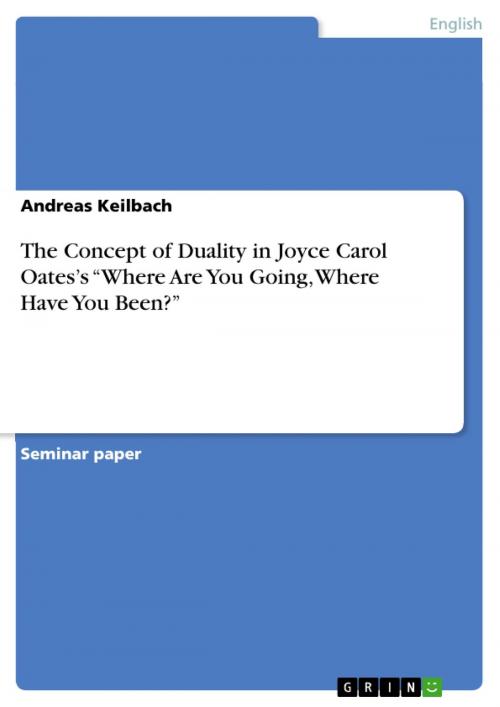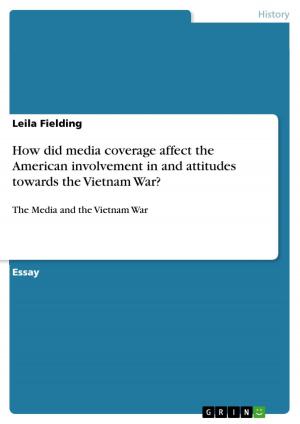The Concept of Duality in Joyce Carol Oates's 'Where Are You Going, Where Have You Been?'
Nonfiction, Entertainment, Drama, Anthologies| Author: | Andreas Keilbach | ISBN: | 9783640403790 |
| Publisher: | GRIN Publishing | Publication: | August 19, 2009 |
| Imprint: | GRIN Publishing | Language: | English |
| Author: | Andreas Keilbach |
| ISBN: | 9783640403790 |
| Publisher: | GRIN Publishing |
| Publication: | August 19, 2009 |
| Imprint: | GRIN Publishing |
| Language: | English |
Seminar paper from the year 2009 in the subject American Studies - Literature, grade: 1,3, University of Freiburg (Englisches Seminar), course: HS The Coming-of-Age Story in America, language: English, abstract: In the 'coming-of-age story' the major conflict of the story lies in the adult world. Rather than focusing on the change of the youth, in the latter story type the youth character is exposed to a confrontation with the adult world. In Oates's story this confrontation consists of the fact that the youth world (Connie) is getting overpowered by the adult world (Arnold Friend). At the beginning of the story, in the title, the reader is confronted with a twofold question pointing in two directions. 'The very title of the story calls attention to duality: a future (where are you going) and a past (where have you been).' Therefore, in this term paper the following thesis will be examined: 'The concept of duality is a basic feature of the 'coming-of-age' story.' It will be shown that in Oates's 'Where Are You Going, Where Have You Been?' one distinctive feature of creating the story type of the 'coming-of-age' story is the concept of duality. While following the twofold pattern of analyzing the representation of the youth world and the adult world, further major techniques of creating duality in Oates's story will be discovered, such as irony, ambiguity, grotesque, parody, allusions, deception, and allegory.
Seminar paper from the year 2009 in the subject American Studies - Literature, grade: 1,3, University of Freiburg (Englisches Seminar), course: HS The Coming-of-Age Story in America, language: English, abstract: In the 'coming-of-age story' the major conflict of the story lies in the adult world. Rather than focusing on the change of the youth, in the latter story type the youth character is exposed to a confrontation with the adult world. In Oates's story this confrontation consists of the fact that the youth world (Connie) is getting overpowered by the adult world (Arnold Friend). At the beginning of the story, in the title, the reader is confronted with a twofold question pointing in two directions. 'The very title of the story calls attention to duality: a future (where are you going) and a past (where have you been).' Therefore, in this term paper the following thesis will be examined: 'The concept of duality is a basic feature of the 'coming-of-age' story.' It will be shown that in Oates's 'Where Are You Going, Where Have You Been?' one distinctive feature of creating the story type of the 'coming-of-age' story is the concept of duality. While following the twofold pattern of analyzing the representation of the youth world and the adult world, further major techniques of creating duality in Oates's story will be discovered, such as irony, ambiguity, grotesque, parody, allusions, deception, and allegory.















